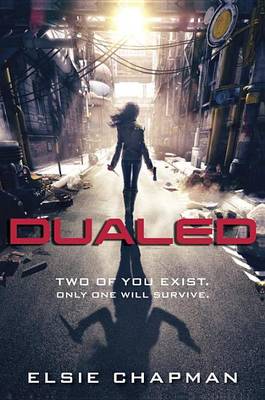Reviewed by violetpeanut on
The general idea is this (from the book):
When the universal cold vaccine had the nasty side effect of irreversible infertility, it was the Board who managed to keep the human race alive through a system of constant and carefully controlled biological intervention. But human nature has a way of disintegrating no matter how many chances it’s given, and the world fell into war. An offshoot of the Board broke off, claimed the upper West Coast of North America as its own, and turned its back on everyone else. It called the massive gated city Kersh, the last war- free zone in the world.
The Board, in its genius, created Alts, manipulating genes so two identical children are born to two sets of parents... both active Alts must hunt each other down until only one remains. It’s the ultimate survival- of- the- fittest test, allowing only those capable of killing to go on and become adults in Kersh.
West has lost her entire family and has recently gone "active." She is also a "striker" - an assassin hired to kill other people's alts. While she has no trouble completing her striker assignments, she is conflicted about killing her own Alt.
The thing I was really most disappointed in was the world-building and the backstory. I want to know why and how the world disintegrated to the point that Kersh had to wall itself off. I want to know what the world is like outside of Kersh. I want to know why people just go along with this idea of killing their Alt. Why does no one rebel? Why did no one rebel when it all started? I wanted to know more about the structure of the city. Chapman gives us bits and pieces - how the city is sectioned and what each section produces - but I didn't really get a great picture of how things would look. I'm hoping that some of these things will be explored more as the series continues.
I was also surprised at where this book led. The ending didn't really shock me, but I was surprised that there wasn't much of a rebellion against the status quo. Most dystopian novels show a progression from acceptance of how things are to questioning of the status quo to full out rebellion and change. Here, there really wasn't any of that. Sure, there were some things that hinted at rebellion - the strikers, for instance - but there is no great fight against the Board. This is really just the story of one girl following the rules in this society. On the one hand, I like that this book didn't follow the same formula as every other book in the genre, but on the other hand, I wanted to see these horrible practices come to an end. Again, I'm hoping that this will change as the series continues.
I really loved the characters. I loved how West was conflicted. She carries an immense amount of guilt, she is angry, she feels defeated. Yet, through it all she is strong. She is convinced that her rutheless Alt is the one who should win, never really acknowledging that her own perseverance, smarts and will to live make her just as worthy.
I loved that there is a hint of romance between West and Chord. West continually pushes him away, feeling that if he is too close, he is in danger. The tension and frustration (not just sexual in nature) is written well. I wanted to smack her for pushing him away, yet I understood why she felt she had too. The romance never overtakes the plot as it does in so many other books. It's important to the book but does not overwhelm it. I look forward to seeing where things go with West and Chord.
Overall I enjoyed Dualed. I look forward to reading the second book in the series in hopes that some of my questions will be answered. This is a good original storyline that could be great if fleshed out a bit more.
Reading updates
- Started reading
- 7 February, 2013: Finished reading
- 7 February, 2013: Reviewed
